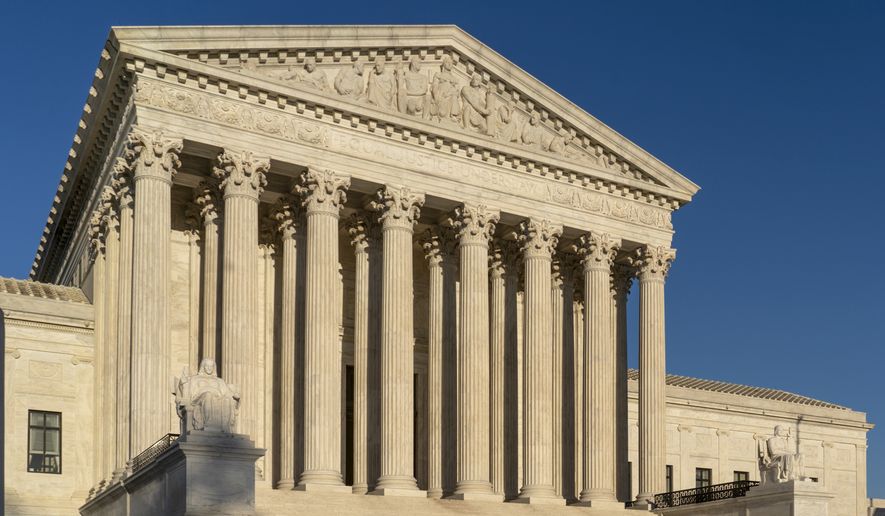California can’t force pro-life crisis pregnancy centers to promote abortion as a health care option, the Supreme Court ruled Tuesday, saying the state’s attempt to do so violated the groups’ First Amendment speech rights.
The justices, in a 5-4 ruling, said a 2015 state law requiring the centers to post notices about obtaining an abortion, including state assistance in paying for the procedure, amounted to government-coerced speech.
“The people lose when the government is the one deciding which ideas should prevail,” Justice Clarence Thomas wrote for the majority.
California argued that the law was needed to educate low-income women with state-funded services. Backers also said they feared women seeking abortions were being duped by the pro-life centers.
But the pro-life centers claimed discrimination because of their views. In posting the notices, they said, they were being forced to advocate for a procedure to which they vehemently object.
Justice Thomas agreed, saying the law specifically targeted clinics with pro-life beliefs instead of all clinics throughout the state. He said if the goal was merely information, then the state had other options.
“California could inform low-income women about its services ’without burdening a speaker with unwanted speech,’” he wrote. “Most obviously, it could inform the women itself with a public information campaign.”
Justice Anthony M. Kennedy, who signed the main opinion, wrote a concurrence saying the law appeared intended to punish those who held pro-life views.
“It does appear that viewpoint discrimination is inherent in the design and structure of this act. This law is a paradigmatic example of the serious threat presented when government seeks to impose its own message in the place of individual speech, thought, and expression,” Justice Kennedy wrote.
The court’s four liberal-leaning justices dissented, led by Justice Stephen G. Breyer. They said California had a valid interest in requiring that the information be posted.
Justice Breyer said the majority ruling could create a slew of litigation, since many laws regulate people’s behavior or speech.
“Virtually every disclosure law could be considered ’content based,’ for virtually every disclosure law requires individuals to speak a particular message,’” he said.
Signed by Gov. Jerry Brown, a Democrat, the law required some licensed medical centers in the state to display a sign reading: “California has public programs that provide immediate free or low-cost access to comprehensive family planning services (including all FDA-approved methods of contraception), prenatal care, and abortion for eligible women. To determine whether you qualify, contact the county social services office at [insert the telephone number].”
The notice had to be at least 8.5 inches by 11 inches in size, displayed in a “clear and conspicuous” manner, written in no less than 48-point type and included in all of the clinic’s print and online advertisements.
The sign also had to be written in English and any other “primary threshold languages” required at the county level. That means the sign had to be posted in 12 languages in Los Angeles County.
Clinics that failed to comply risked a fine of $500 for a first offense and $1,000 for each subsequent one.
Hawaii and Illinois have similar laws on the books.
Pro-life advocates applauded the ruling.
“These centers exist to offer women a clear alternative to abortion and the abortion lobby bullied them all the way to the Supreme Court because they could not tolerate authentic choice for women,” said Ashley McGuire, senior fellow at The Catholic Association. “Our First Amendment right to freedom of speech not only protects the right to speak out; it protects the right not to speak.”
Michael Farris, president of Alliance Defending Freedom, a religious liberty law firm that represented the challengers to California’s law, said the ruling should set a standard.
“Tolerance and respect for good-faith differences of opinion are essential in a diverse society like ours,” Mr. Farris said. “They enable us to coexist peacefully with one another. If we want to have freedom for ourselves, we have to extend it to others.”
Pro-choice advocates, though, predicted that the ruling would enable “fake clinics.”
“This empowers those who insert deception and abortion stigma into healthcare, a decision which has an outsized impact on women of color, low income women, and other marginalized communities who have barriers to quality, comprehensive reproductive healthcare,” a team from Reproaction, an abortion rights organization, said in a statement.
Willie Parker, the chair of Physicians for Reproductive Health, said the Supreme Court failed to recognize “the threat that fake women’s health centers pose.”
“As doctors, we know it’s important for pregnant women to have all of the information and resources they need. No one should use deceptive or manipulative tactics to prevent someone from learning about abortion or contraception, and no one should delay women from getting care,” he said.
• Bradford Richardson can be reached at brichardson@washingtontimes.com.
• Alex Swoyer can be reached at aswoyer@washingtontimes.com.




Please read our comment policy before commenting.